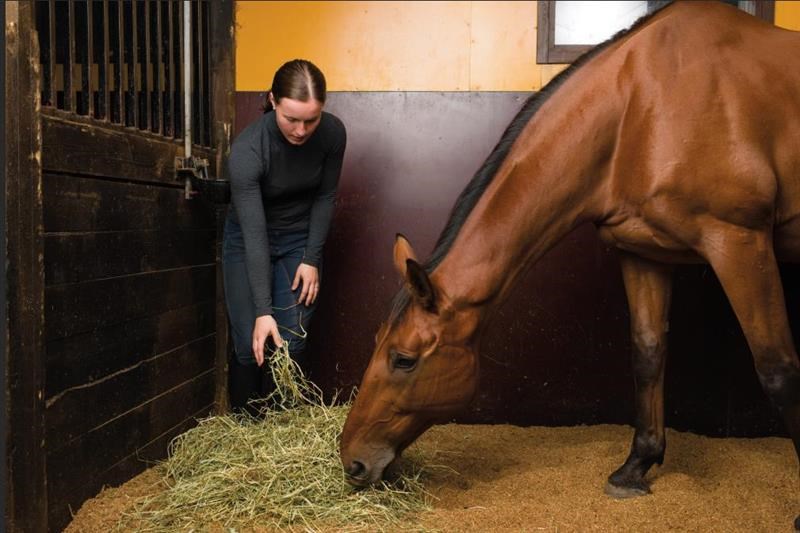Whatever your driving discipline, it is your horse’s joints that keep him moving, Lisa Elliott MSc, nutritionist atCastle Horse Feeds, gives us some insights into how best to feed your horse for optimum joint health. First published in Carriage Driving, November 2019
But were you aware that there are three types of joints within your horses’ body? Namely - fibrous or ‘fixed’ joints, cartilaginous and synovial. The synovial joints are the ones that provide movement and your horse has 18 of them spread throughout the skeleton! Providing these joints with the right nutrition throughout your horse’s life is essential to maintain joint function and performance and minimise injury and a good place to start is knowing what the joint needs to remain healthy.
What makes a healthy joint?
Every synovial joint in your horse’s body contains two bony ends, covered by articular cartilage, which is a type of connective tissue, and encased within a joint capsule. The inner layer of the joint capsule, called the ‘synovial membrane’ secretes synovial fluid which provides cushioning and prevents friction between the joint structures, and the outer layer helps support and stabilise the joint. The synovial fluid within the joint nourishes the joint cartilage. It’s important to realise that the joint should be thought of as a whole organ with key relationships between cartilage, bone and synovial fluid, where the synovial fluid supplies the vital nutrients for the joint to remain healthy and functioning well.
The synovial fluid contains a combination of different compounds, all of which are integral to joint health. A major component of synovial fluid is hyaluronic acid which is a type of glycosaminoglycan (GAG) made up of a carbohydrate, attached to a protein backbone. Hyaluronic Acid helps give synovial fluid its viscosity along with a type of protein called lubricin.
Articular cartilage contains a matrix of collagen, proteoglycans and water. Hyaluronic acid is also present in cartilage. Proteoglycans help the cartilage become elastic and strong and are made up of chains of GAGs and incorporate chondroitin and keratin sulphate.
Maintenance of these joint constituents is essential for healthy joints, so how can you ensure you are supplying the right nutrition to support them?
Provide a balanced diet which supplies key nutrients
One of the most important nutrients for joints is glucose, which is normally abundant in the horses’ diet from grass and hay. Glucose provides the basis for building GAGs and proteoglycans. Protein is needed for proteoglycans and collagen, so ensuring your horse is getting a good supply of all their essential amino acids will help build the protein needed for good joint integrity. Essential amino acids can be provided through feeding a nutritious balancer or from a good compound feed fed at the recommended levels, along with good quality forage.
Joints require certain micronutrients to provide the basis to maintain and support good joint health and integrity. Calcium and phosphorus help to contribute to the joints’ mineral pool and are key constituents of bone, but they need to be supplied in the diet at the correct ratio of 2:1 (calcium to phosphorus) to ensure bones stay strong and healthy. Strong, healthy bones mean less stress on joints, which promotes healthy, well-functioning joints. Other essential minerals include copper, zinc and sulphur, which are all important in the formation and defence of cartilage. Important vitamins for joint and bone health include Vitamin A, D and B vitamins along with Vitamin E, which through its antioxidant properties can help minimise damage to joints. Providing a forage rich diet with a nutritious balancer or correct levels of a fully fortified compound feed will help supply these key micronutrients at the right balance for optimum joint health.
Manage Weight
Managing your horse’s weight is potentially the most important thing you can do to support healthier joints. Extra weight puts extra pressure on joints and when there is increased pressure on joints they can be subject to trauma and damage, the effects of which are often irreversible and will lead to arthritis.
Regular use of a weight tape and body condition scoring chart (BCS) is essential to help manage their weight. Ensuring your horse stays somewhere between 5 and 6 on a 9 point BCS chart, will help maintain a healthy weight which doesn’t compromise the joints.
Provide correct nutritional support
Joint supplements containing glucosamine, chondroitin sulphate and hyaluronic acid are thought to help promote healthier joints because they provide key joint requirements in a readily available form to help promote integrity and reduce inflammation. However, to offer any potential benefits these nutrients need to get into the synovial fluid itself. Research has shown that quite often they do not reach the joint and as a result they often don’t have any positive effects on joint health. It’s also important to consider that each of these compounds can be made in the horse’s joint if the basic nutrients are already in place from a balanced diet.
Omega 3 fatty acids are known for their anti-inflammatory properties and a good way of helping to prevent damage to joints is to help control inflammatory processes within the joint. Making sure the diet provides higher levels of omega 3 than omega 6 fatty acids may help control inflammation, to support better joint health. Research has shown that omega 3 fatty acids do reach the synovial fluid so they have good potential. Linseed meal is a great source of omega 3 fatty acids and may be a useful addition to the diet when feeding for healthier joints.
Even with the best diet and nutritional management, it goes without saying that joints need to keep moving to enhance their health. Ensuring your horse has a regular exercise routine alongside the right nutrition is, therefore, the best way to promote maximum joint health, function and integrity for optimum performance.
For further advice, please contact Lisa at Castle Horse Feeds – theteam@castlehorsefeeds.com
For more information see www.castlehorsefeeds.com or call 01497 570345.
First published in Carriage Driving, November 2019
